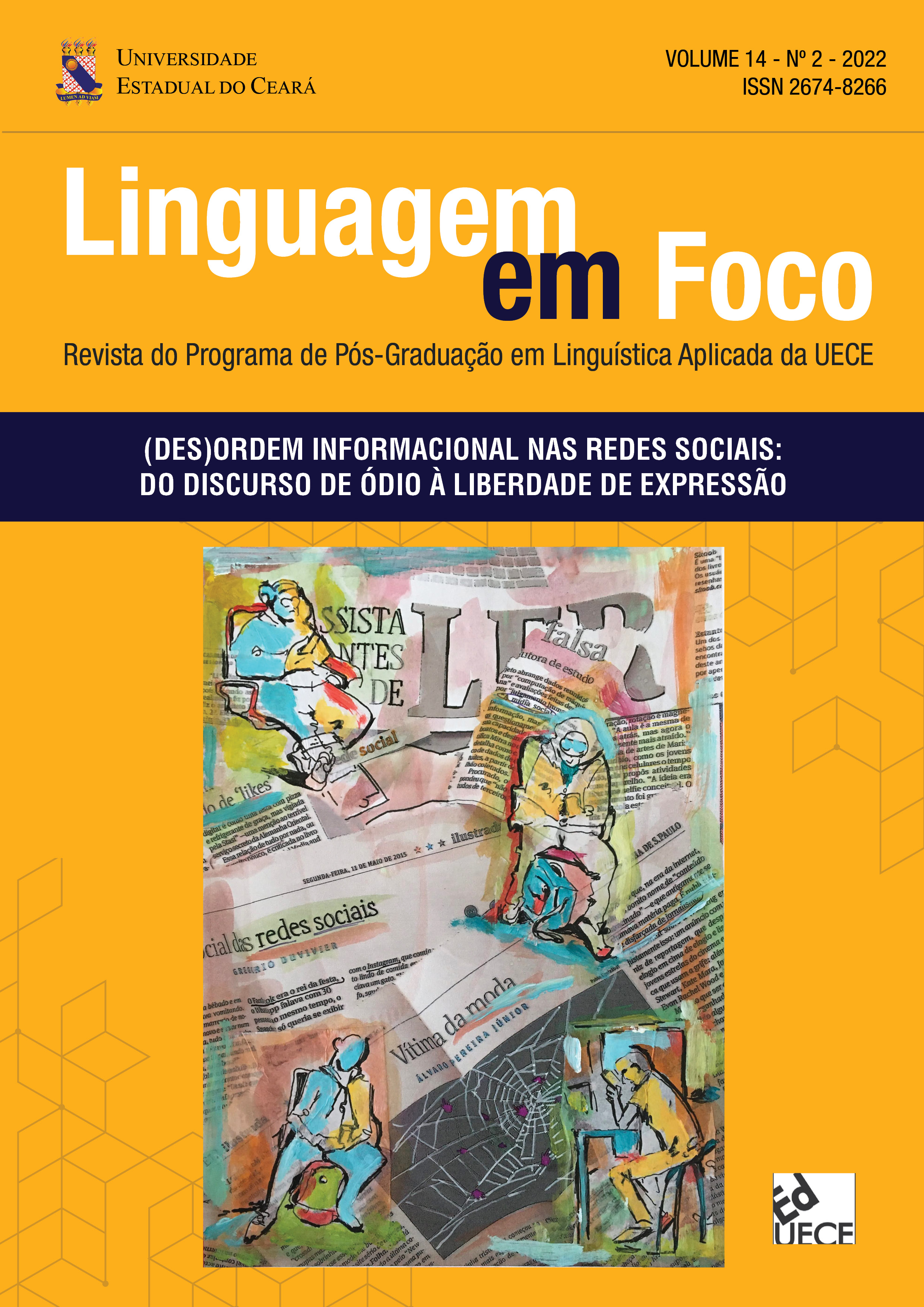“If it can’t harm, why do not take it?”
A study on the bolsonarist pro-chloroquine disinformation campaign
DOI:
https://doi.org/10.46230/2674-8266-14-9356Keywords:
Disinformation, Chloroquine, BolsonaroAbstract
The aim of this article was to analyze the disinformation campaign promoted by the Brazilian Federal Government in favor of the use of Chloroquine as part of the so-called “early treatment” against Covid-19. Therefore, we analyze the mentions to the treatment with Chloroquine made by the President of the Republic, Jair Messias Bolsonaro, mainly in his lives on Youtube. To verify the reachability of these presidential speeches, we sought to correlate the referred lives to the search indexes for the keyword “chloroquine” on the Google search site, through the Google Trends tool. The data obtained demonstrate that it is possible to establish a relationship between the mentions made to Chloroquine by the President of the Republic and the significant increase in the search for this term on the Google search site. In addition, the high recurrence of the discourse in favor of the so-called “early treatment” indicates that there was also a disinformation campaign orchestrated in order to deceive or confuse the public opinion with serious consequences yet to be investigated.
Downloads
References
ALLCOTT, H.; GENTZKOW, M. Social media and fake news in the 2016 election. Journal of Economic Perspectives, v. 31(2), 211-236, 2017. Disponível em: https://pubs.aeaweb.org/doi/pdfplus/10.1257/jep.31.2.211. Acesso em: 13 jun. 2021.
AYMANNS, C.; FOSTER, J.; GEORGE, C. P. Fake News in Social Networks. Working Papers on Finance 1804, University of St. Gallen, School of Finance. 2017. Disponível em: https://arxiv.org/abs/1708.06233. Acesso em: 23 maio 2021.
BOTEI, M. Misinformation with fake News. Bulletin of the transilvania University of Braşov, v. 10, n. 2, p. 133-140, nov. 2017.
BRAGA, R. M. C. A Indústria das Fake News e o Discurso de Ódio. In: PEREIRA, R. V. (org.) Direitos políticos, liberdade de expressão e discurso de ódio. Belo Horizonte: IDDE, 2018. p. 203-220.
BRISOLA, A.; BEZERRA, A. C. Desinformação e Circulação de “Fake News”: distinções, diagnóstico e reação. In: XIX ENCONTRO NACIONAL DE PESQUISA EM CIÊNCIA DA INFORMAÇÃO - ENANCIB, Londrina: Universidade Estadual de Londrina, 2018. Anais [...], Londrina, 2018.
BOUNEGRU, L.; GRAY, J.; VENTURINI, T.; MAURI, M. A field guide to fake news. Public Data Lab, 2017. Disponível em: https://fakenews.publicdatalab.org/. Acesso em: 21 maio 2021.
KALIL, I.; SANTINI, R. M. “Coronavírus, Pandemia, Infodemia e Política”. Relatório de pesquisa. Divulgado em 01 de abril de 2020. 21p. São Paulo/Rio de Janeiro: FESPSP/UFRJ. Disponível em: https://www.fespsp.org.br/store/file_source/FESPSP/Documentos/Coronavirus-e-infodemia.pdf. Acesso em: 14 jun. 2021.
LINS, E. S.; LOPES, F. Trevas e Queda: análise do imaginário feminino na representação de Fake News sobre Marielle Franco. Revista Memorare, Tubarão, v. 5, n. 1, p. 78-96, 2018.
MATOS, R. C. De Fake news frente a pandemia de COVID-19. Vigilância Sanitária em Debate: Sociedade, Ciência & Tecnologia (Health Surveillance under Debate: Society, Science & Technology), v. 8, n. 3, p. 78-85, 2020. Disponível m: https://visaemdebate.incqs.fiocruz.br/index.php/visaemdebate/article/view/1595. Acesso em: 17 maio 2021.
MANDETTA, L. H. Um paciente chamado Brasil. Editora Objetiva, 2020.
MCGOEY, L. The logic of strategic ignorance. The British journal of sociology, v. 63, n. 3, p. 533-576, 2012.
OLIVEIRA, M. L. P.; SOUZA, E. D. A competência crítica em informação no contexto das fake news: os desafios do sujeito informacional no ciberespaço. In: ENCONTRO NACIONAL DE PESQUISA EM CIÊNCIA DA NFORMAÇÃO, 19, 2018, Londrina. Anais [...]. Londrina: UEL, 2018.
PENNYCOOK, G.; RAND, D. G. Lazy. Not biased: susceptibility to partisan fake news is better explained by lack of reasoning than by motivated reasoning. Cognition, [s.l.], v. 188, p. 39-50, 2019.
RECUERO, R.; GRUZD, A. Cascatas de fake news políticas: um estudo de caso no Twitter. Galaxia, São Paulo, n. 41, p. 31-47, maio/ago. 2019.
SANTOS. B. S. A cruel pedagogia do vírus. Coimbra, Portugal: Almedina, 2020.
SOUSA JÚNIOR, J. H.; PETROLL, M. D. L. M.; ROCHA, R. A. Fake News e o Comportamento Online dos Eleitores nas Redes Sociais durante a Campanha Presidencial Brasileira de 2018. In: XXII SEMEAD – SEMINÁRIOS EM ADMINISTRAÇÃO, USP, São Paulo, 2019. Anais [...], São Paulo, 2019.
VARELA, J. Blogs vs. SMS: Periodismo 3.0: la socialización de la información. Revista Telos, Madri, Fundación Telefonica, v. 65, out.-dez. 2005.
VOLKOFF, V. Pequena história da desinformação: do Cavalo de Tróia à Internet. Curitiba, Ed. Vila do Príncipe, 2004.
WARDLE, C.; DERAKHSHAN, H. Information disorder: toward an interdisciplinary framework for research and policy making. [s. l.]: Council of Europe report, 2017. Disponível em: https://rm.coe.int/information-disordertoward-an-interdisciplinary-framework-for-researc/168076277c. Acesso em: 13 abr. 2021.
WARDLE, C.; DERAKHSHAN, H. Thinking about ‘information disorder’: formats of misinformation, disinformation, and mal-information. In: IRETON, C.; POSETTI, J. (org.). Journalism, ‘fake news’ & disinformation. Paris: UNESCO; 2018. p. 43-54. Disponível em: https://bit.ly/2FW3Esb. Acesso em: 23 maio 2021.
Published
How to Cite
Issue
Section
License
Copyright (c) 2022 João Paulo Eufrazio de Lima

This work is licensed under a Creative Commons Attribution 4.0 International License.
Authors who publish in Linguagem em Foco Scientific Journal agree to the following terms:
- Authors retain the copyright and grant the journal the right of first publication. The articles are simultaneously licensed under the Creative Commons Attribution License which allows sharing the work with an acknowledgement of its authorship and initial publication in this journal.
- The concepts issued in signed articles are the absolute and exclusive responsibility of their authors. Therefore, we request a Statement of Copyright, which must be submitted with the manuscript as a Supplementary Document.
- Authors are authorized to make the version of the text published in Linguagem em Foco Scientific Journal available in institutional repositories or other academic work distribution platforms (ex. ResearchGate, Academia.edu).





























